Otto Mellies (1931-2020) was a German actor and voice actor. For the DEFA, he appeared in several films during the 1950s and 1960s. He was also the German voice of Paul Newman.

East-German postcard by VEB Progress Film-Vertrieb, Berlin, no. 2247, 1965. Photo: Schwarzer.
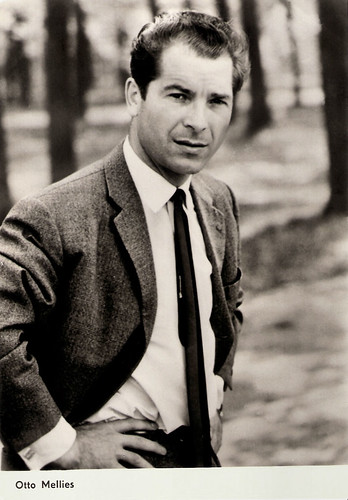
East-German postcard by VEB Progress Film-Vertrieb, Berlin, no. 2927, 1967. Photo: Balinski.
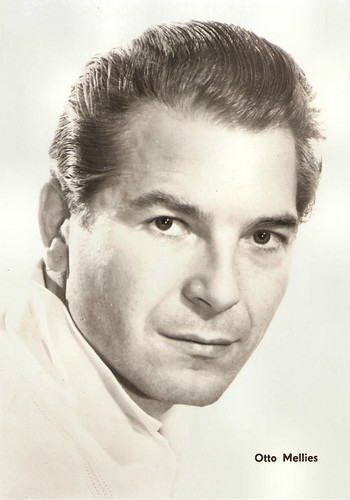
East-German postcard by VEB Progress Film-Vertrieb, Berlin, no. 64/69, 1969. Photo: Winkler.
Otto Ewald Ernst Mellies was born in 1931 in Schlawe (some sources say in nearby Stolp), Germany (now Slawno, Poland). His father was a hairdressing foreman.
A large part of his family died just before the end of the war (His mother, a sister, and three of her children were murdered). He and his older brother, the later actor Eberhard Mellies, had to take care of themselves. The 14 years-old Otto worked as a caretaker for horses of Russian soldiers.
From 1947 to 1949, he attended the Staatliche Schauspielschule Schwerin (State Drama School in Schwerin) and followed lessons by director Lucie Höflich. His first employer in 1949 was the Mecklenburgisches Staatstheater Schwerin. His debut role was that of the student in Johann Wolfgang von Goethe's Faust.
He then played in Neustrelitz, Stralsund, Rostock and Erfurt. At the Stralsund Theater, Mellies debuted in 1951 in Gotthold Ephraim Lessing’s classic play Nathan der Weise (Nathan the Wise) in the role of the Temple Lord.
In 1956, theatre director Wolfgang Langhoff brought him to the Deutsches Theater, one of the most prominent companies in Berlin. He belonged to the ensemble for 50 years.
At the Deutsches Theater, he appeared in Henrik Ibsen's Peer Gynt, Jean-Paul Sartre's Die Fliegen/Les Mouches/The Flies and August Strindberg's Gespenstersonate/Spöksonaten/The Ghost Sonata. He repeatedly played under the direction of Jürgen Gosch and Thomas Langhoff.
He is best known as Nathan the Wise in the production of Friedo Solter. Lessing's Nathan the Wise was the showpiece with which the Deutsches Theater was reopened in 1945.
Since then, the play ran and ran, only the main actors changed: Paul Wegener, Eduard von Winterstein, Wolfgang Heinz - and from 1987 on Otto Mellies.
Otto Mellies performed Nathan in a black coat, black suit, and white shirt. Under the black Kippa, he showed a bleak face with a three-day-beard. He has appeared thus in this role 325 times till 2005.
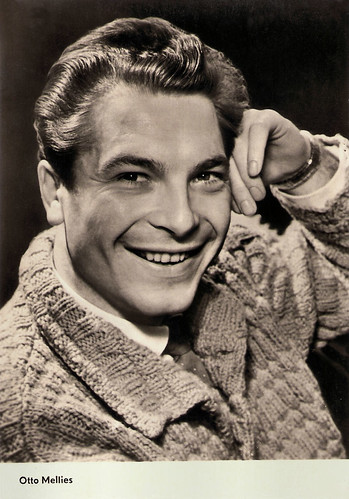
East-German postcard by VEB Progress Film-Vertrieb, Berlin, no. 1617, 1961. Photo: Paszkowiak.
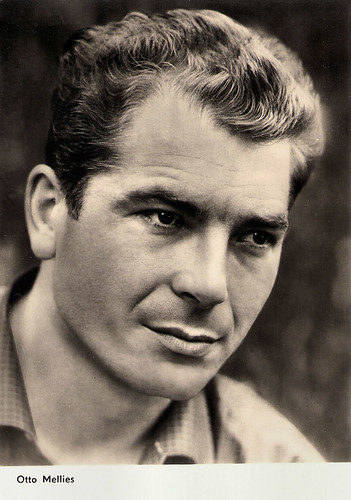
East-German postcard by VEB Progress Film-Vertrieb, Berlin, no. 2225, 1965. Photo: Schwarz.
Since 1955, Otto Mellies was also working for the cinema. His debut film was the DEFA production Sommerliebe/Summer Love (Franz Barrenstein, 1955).
In 1960 he was awarded the Heinrich Greif Prize First Class for his role as Ferdinand in Kabale and Liebe/Intrigue and Love (Martin Hellberg, 1959).
Other popular films are the Jacques Offenbach-Operetta film Die schöne Lurette/Beautiful Lurette (Gottfried Kolditz, 1960) and the literature adaptation Minna von Barnhelm oder das Soldatenglück (Martin Hellberg, 1962).
In addition, Mellies worked as a voice actor. After the death of Gert Günther Hoffmann he became the German voice of Paul Newman. In addition, he dubbed such actors as Christopher Lee, Michael Gambon, Maximilian Schell, Albert Finney, and Raf Vallone and also participated in numerous radio plays.
In 2012 he was awarded the Deutscher Filmpreis (German Film Award) for Best Supporting Actor for his role in Halt auf freier Strecke/Stopped on Track (Andreas Dresen, 2011).
Halt auf freier Strecke is a drama about a 44 years-old Berlin family man (played by Milan Peschel), who is slowly dying from a brain tumor. Mellies played Peschel's father. The film won several awards.
Since 2015, Mellies moderated the radio show Abschied ist ein leises Wort (Farewell is a quiet word). The program commemorated recently deceased celebrities or public figures.
Otto Mellies passed away in 2020 at the age of 89. He was married to former singer Luise and had two children.
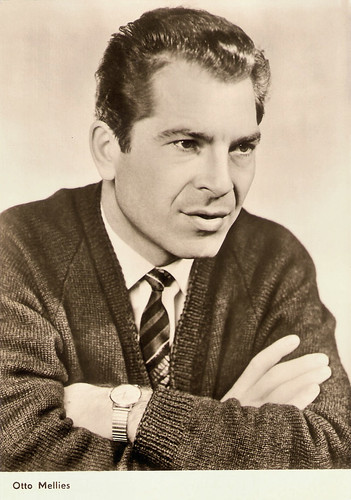
East-German postcard by VEB Progress Film-Vertrieb, Berlin, no. 2608, 1966. Photo: Gerbeth.
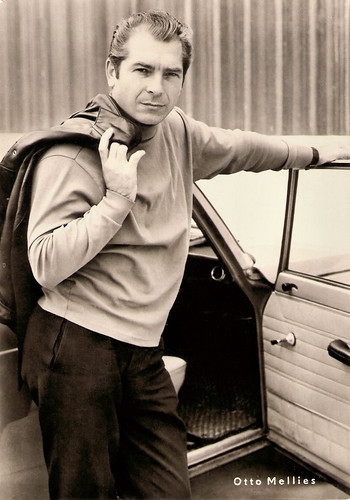
East-German postcard by VEB Progress Film-Vertrieb, Berlin, no. 202/70, 1970. Photo: Peters.

German postcard by Deutsches Theater Berlin / Kammerspiele Berlin, 1996. Photo: Frank Splanemann. Otto Mellies as Gremio in the stage play 'Der Widerspenstigen Zähmung' (The Taming of the Shrew) by William Shakespeare. Simone von Zglinicki played Katharina and Guntram Brattia Petruchio. Director was Johanna Schall.
Sources: Christian Eger (Mitteldeutsche Zeitung - German), Ines Walk (Film-zeit.de – German), Wikipedia (German), and IMDb.
This post was last updated on 28 April 2020.

East-German postcard by VEB Progress Film-Vertrieb, Berlin, no. 2247, 1965. Photo: Schwarzer.

East-German postcard by VEB Progress Film-Vertrieb, Berlin, no. 2927, 1967. Photo: Balinski.

East-German postcard by VEB Progress Film-Vertrieb, Berlin, no. 64/69, 1969. Photo: Winkler.
Nathan the Wise
Otto Ewald Ernst Mellies was born in 1931 in Schlawe (some sources say in nearby Stolp), Germany (now Slawno, Poland). His father was a hairdressing foreman.
A large part of his family died just before the end of the war (His mother, a sister, and three of her children were murdered). He and his older brother, the later actor Eberhard Mellies, had to take care of themselves. The 14 years-old Otto worked as a caretaker for horses of Russian soldiers.
From 1947 to 1949, he attended the Staatliche Schauspielschule Schwerin (State Drama School in Schwerin) and followed lessons by director Lucie Höflich. His first employer in 1949 was the Mecklenburgisches Staatstheater Schwerin. His debut role was that of the student in Johann Wolfgang von Goethe's Faust.
He then played in Neustrelitz, Stralsund, Rostock and Erfurt. At the Stralsund Theater, Mellies debuted in 1951 in Gotthold Ephraim Lessing’s classic play Nathan der Weise (Nathan the Wise) in the role of the Temple Lord.
In 1956, theatre director Wolfgang Langhoff brought him to the Deutsches Theater, one of the most prominent companies in Berlin. He belonged to the ensemble for 50 years.
At the Deutsches Theater, he appeared in Henrik Ibsen's Peer Gynt, Jean-Paul Sartre's Die Fliegen/Les Mouches/The Flies and August Strindberg's Gespenstersonate/Spöksonaten/The Ghost Sonata. He repeatedly played under the direction of Jürgen Gosch and Thomas Langhoff.
He is best known as Nathan the Wise in the production of Friedo Solter. Lessing's Nathan the Wise was the showpiece with which the Deutsches Theater was reopened in 1945.
Since then, the play ran and ran, only the main actors changed: Paul Wegener, Eduard von Winterstein, Wolfgang Heinz - and from 1987 on Otto Mellies.
Otto Mellies performed Nathan in a black coat, black suit, and white shirt. Under the black Kippa, he showed a bleak face with a three-day-beard. He has appeared thus in this role 325 times till 2005.

East-German postcard by VEB Progress Film-Vertrieb, Berlin, no. 1617, 1961. Photo: Paszkowiak.

East-German postcard by VEB Progress Film-Vertrieb, Berlin, no. 2225, 1965. Photo: Schwarz.
Intrigue and Love
Since 1955, Otto Mellies was also working for the cinema. His debut film was the DEFA production Sommerliebe/Summer Love (Franz Barrenstein, 1955).
In 1960 he was awarded the Heinrich Greif Prize First Class for his role as Ferdinand in Kabale and Liebe/Intrigue and Love (Martin Hellberg, 1959).
Other popular films are the Jacques Offenbach-Operetta film Die schöne Lurette/Beautiful Lurette (Gottfried Kolditz, 1960) and the literature adaptation Minna von Barnhelm oder das Soldatenglück (Martin Hellberg, 1962).
In addition, Mellies worked as a voice actor. After the death of Gert Günther Hoffmann he became the German voice of Paul Newman. In addition, he dubbed such actors as Christopher Lee, Michael Gambon, Maximilian Schell, Albert Finney, and Raf Vallone and also participated in numerous radio plays.
In 2012 he was awarded the Deutscher Filmpreis (German Film Award) for Best Supporting Actor for his role in Halt auf freier Strecke/Stopped on Track (Andreas Dresen, 2011).
Halt auf freier Strecke is a drama about a 44 years-old Berlin family man (played by Milan Peschel), who is slowly dying from a brain tumor. Mellies played Peschel's father. The film won several awards.
Since 2015, Mellies moderated the radio show Abschied ist ein leises Wort (Farewell is a quiet word). The program commemorated recently deceased celebrities or public figures.
Otto Mellies passed away in 2020 at the age of 89. He was married to former singer Luise and had two children.

East-German postcard by VEB Progress Film-Vertrieb, Berlin, no. 2608, 1966. Photo: Gerbeth.

East-German postcard by VEB Progress Film-Vertrieb, Berlin, no. 202/70, 1970. Photo: Peters.

German postcard by Deutsches Theater Berlin / Kammerspiele Berlin, 1996. Photo: Frank Splanemann. Otto Mellies as Gremio in the stage play 'Der Widerspenstigen Zähmung' (The Taming of the Shrew) by William Shakespeare. Simone von Zglinicki played Katharina and Guntram Brattia Petruchio. Director was Johanna Schall.
Sources: Christian Eger (Mitteldeutsche Zeitung - German), Ines Walk (Film-zeit.de – German), Wikipedia (German), and IMDb.
This post was last updated on 28 April 2020.
1 comment:
What a wonderful set of pictures. His life is interesting. I wonder what he looks like as an older fellow. He must be almost 90 now. Thank you for posting this. I was quite intrigued by this handsome fellow.
Hope all is well with you across the seas, my Friend! Spring is finally beginning to show itself. A lilac tree I planted well over 12 years ago has decided to bloom. I am SO happy with that! :D
Have a lovely week, Paul. My best to you and yours.
Post a Comment